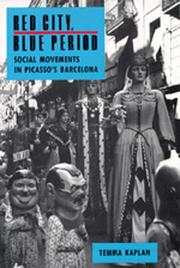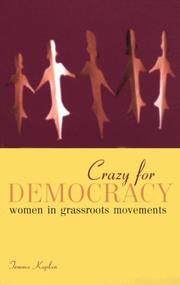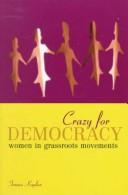| Listing 1 - 10 of 12 | << page >> |
Sort by
|

ISBN: 0585249792 0520084403 0520075072 Year: 1992 Publisher: Berkeley : University of California Press,
Abstract | Keywords | Export | Availability | Bookmark
 Loading...
Loading...Choose an application
- Reference Manager
- EndNote
- RefWorks (Direct export to RefWorks)
"In Red City, Blue Period, Temma Kaplan captures the social and cultural richness of Barcelona, a city famous for its resistance to repression and its love of art. Known both as the city of bombs and the Paris of the south, Barcelona between 1888 and 1939 was home to flower vendors and seamstresses, bakers and metal workers, nuns and prostitutes, all of whom joined the ranks of protestors at one time or another. The cultural realm was a contested area, as worshipers of numerous patron saints and Madonnas shared the streets with terrorists and with those, like the young Pablo Picasso, who simply loved the parade floats and raucous folk figures that accompanied religious festivals." "Moving from seedy cafes, where political activists mingled with artists and police agents, to brothels, where prostitutes earned a living, to puppet theaters, where adults became acclimated to life in the Catalan city, Kaplan reveals how citizens came to understand populist politics and how they created a new culture based on particular visions of the past and goals for the future. Analyzing the peculiar sense of solidarity the citizens of Barcelona forged during this period, she explains why shared experiences of civic culture and pageantry could sometimes galvanize resistance to authoritarian national governments but could not always overcome local struggles based on class and gender." "Combining the methods of anthropology and the new cultural history, Red City, Blue Period evokes a city of intrigue and violence, but also one of political commitment, bawdy humor, and extraordinary beauty."--Jacket.
Social movements --- Arts and society --- Social Conditions --- Sociology & Social History --- Social Sciences --- History. --- History --- Picasso, Pablo, --- Barcelona (Spain) --- Spain --- Social life and customs. --- Intellectual life. --- Arts --- Arts and sociology --- Society and the arts --- Sociology and the arts --- Movements, Social --- Social aspects --- Bīkāsū, Bāblū, --- Luyisi Bikasuo, Babuluo, --- Luzi Bikasuo, Babuluo, --- Pikaso, Pablo, --- Pikaso, Paburo, --- Pikasso, Pablo, --- Ruiz, Pablo, --- Ruiz Picasso, Pablo, --- Ruiz y Picasso, Pablo, --- Ruys, Pablo, --- Ruys Picasso, Pablo, --- פיקאסו --- פיקאסו, פאבלו, --- פיקאסו, פבלו --- ピカソパブロ, --- Bijiasuo, --- Barcino (Spain) --- Barcellona (Spain) --- Barchinone (Spain) --- Barcinona (Spain) --- Barcenona (Spain) --- Barchillona (Spain) --- Barchino (Spain) --- Barcinonia Civitas (Spain) --- Barcinonis Civitas (Spain) --- Barcollona (Spain) --- Barschaluna (Spain) --- Barchinona (Spain) --- Barchinonia (Spain) --- Barcillona (Spain) --- Barzalum (Spain) --- Barzellona (Spain) --- Colonia Barcino (Spain) --- Colonia Barcino Faventia (Spain) --- Colonia Faventia (Spain) --- Colonia Faventia Iulia Augusta Pia Barcino (Spain) --- Colonia Flaventia (Spain) --- Faventia (Spain) --- Iulia Augusta Barcino (Spain) --- Pia Barcino (Spain) --- Social history --- Social psychology --- Bīkāsū, Bāblū --- Luyisi Bikasuo, Babuluo --- Luzi Bikasuo, Babuluo --- Pikaso, Pablo --- Pikaso, Paburo --- Pikasso, Pablo --- Ruiz, Pablo --- Ruiz Picasso, Pablo --- Ruys, Pablo --- Ruys Picasso, Pablo --- ピカソパブロ --- Bijiasuo
Book
ISBN: 0691052360 0691616698 0691643938 1322883599 1400869714 Year: 1977 Publisher: Princeton (N.J.): Princeton university press
Abstract | Keywords | Export | Availability | Bookmark
 Loading...
Loading...Choose an application
- Reference Manager
- EndNote
- RefWorks (Direct export to RefWorks)
Andalusian anarchism was a grassroots movement of peasants and workers that flourished in Cádiz Province, the richest sherry-producing area in the world, from about 1868 to 1903. This study focuses on the social and economic context of the movement, and argues that traditional interpretations of anarchism as irrational, spontaneous, or millenarian are not justified. The extensive archival research undertaken for this book leads Temma Kaplan to a major reinterpretation of the nature of anarchism. Using the police reports in local archives to reconstruct the lives of more than three hundred rank-and-file anarchists, Temma Kaplan shows that the Andalusian movement was highly organized and dedicated to defending the interests of workers and peasants through a wide variety of organizations. These included trade unions, workers' circles, and women's societies, all of which favored general strikes and insurrections rather than terrorism.Originally published in 1977.The Princeton Legacy Library uses the latest print-on-demand technology to again make available previously out-of-print books from the distinguished backlist of Princeton University Press. These editions preserve the original texts of these important books while presenting them in durable paperback and hardcover editions. The goal of the Princeton Legacy Library is to vastly increase access to the rich scholarly heritage found in the thousands of books published by Princeton University Press since its founding in 1905.
Anarchists --- History. --- Anarchism and anarchists --- Anarchism --- History

ISBN: 0520936876 1597349291 9780520936874 1417522593 9781417522590 9780520226715 0520226712 9780520236493 0520236491 9781597349291 Year: 2004 Publisher: Berkeley University of California Press
Abstract | Keywords | Export | Availability | Bookmark
 Loading...
Loading...Choose an application
- Reference Manager
- EndNote
- RefWorks (Direct export to RefWorks)
Toward the end of the twentieth century in places ranging from Latin America and the Caribbean to Europe, the United States, South Africa, Nigeria, Iran, Japan, China, and South Asia, women and young people took to the streets to fight injustices they believed they could not confront in any other way.
Women in politics-- Chile. --- Women --- Youth --- Protest movements --- Gender Studies & Sexuality --- Gender & Ethnic Studies --- Social Sciences --- Social movements --- Young people --- Young persons --- Youngsters --- Youths --- Age groups --- Life cycle, Human --- Human females --- Wimmin --- Woman --- Womon --- Womyn --- Females --- Human beings --- Femininity --- Political activity --- Political activity.
Book
ISBN: 0199929963 019971374X 9780199713745 Year: 2015 Publisher: New York : Oxford University Press,
Abstract | Keywords | Export | Availability | Bookmark
 Loading...
Loading...Choose an application
- Reference Manager
- EndNote
- RefWorks (Direct export to RefWorks)
At a moment when the term ""Democracy"" is evoked to express inchoate aspirations for peace and social change or particular governmental systems that may or may not benefit more than a select minority of the population, this book examines attempts from ancient Mesopotemia to the democratic movements of the early twenty-first century to sustain and improve their own lives and those of outsiders who have migrated into territory they regard as their own. Democratic activists have formed organizations to regulate the distribution of water, to restore the environment, and to assure that they and th
Democracy. --- Government accountability. --- State, The. --- Administration --- Commonwealth, The --- Sovereignty --- Political science --- Accountability in government --- Public administration --- Responsibility --- Self-government --- Equality --- Representative government and representation --- Republics
Book
ISBN: 9781400869718 1400869714 9780691616698 0691616698 0691643938 Year: 2015 Publisher: Princeton, NJ
Abstract | Keywords | Export | Availability | Bookmark
 Loading...
Loading...Choose an application
- Reference Manager
- EndNote
- RefWorks (Direct export to RefWorks)
Andalusian anarchism was a grassroots movement of peasants and workers that flourished in Cádiz Province, the richest sherry-producing area in the world, from about 1868 to 1903. This study focuses on the social and economic context of the movement, and argues that traditional interpretations of anarchism as irrational, spontaneous, or millenarian are not justified. The extensive archival research undertaken for this book leads Temma Kaplan to a major reinterpretation of the nature of anarchism. Using the police reports in local archives to reconstruct the lives of more than three hundred rank-and-file anarchists, Temma Kaplan shows that the Andalusian movement was highly organized and dedicated to defending the interests of workers and peasants through a wide variety of organizations. These included trade unions, workers' circles, and women's societies, all of which favored general strikes and insurrections rather than terrorism.Originally published in 1977.The Princeton Legacy Library uses the latest print-on-demand technology to again make available previously out-of-print books from the distinguished backlist of Princeton University Press. These editions preserve the original texts of these important books while presenting them in durable paperback and hardcover editions. The goal of the Princeton Legacy Library is to vastly increase access to the rich scholarly heritage found in the thousands of books published by Princeton University Press since its founding in 1905.
Anarchisme --- Anarchism --- Anarchism and anarchists --- Anarchy --- Government, Resistance to --- Libertarianism --- Nihilism --- Socialism --- Histoire. --- History. --- Anarchists

ISBN: 0415916631 Year: 1997 Publisher: New York (N.Y.) : Routledge,
Abstract | Keywords | Export | Availability | Bookmark
 Loading...
Loading...Choose an application
- Reference Manager
- EndNote
- RefWorks (Direct export to RefWorks)

ISBN: 0203760611 1134719256 1134719183 9781134719181 9781134719259 9780415916622 0415916623 0415916631 9780415916639 Year: 2016 Publisher: Abingdon, Oxon New York, NY
Abstract | Keywords | Export | Availability | Bookmark
 Loading...
Loading...Choose an application
- Reference Manager
- EndNote
- RefWorks (Direct export to RefWorks)
Book
Year: 1977 Publisher: Princeton University Press
Abstract | Keywords | Export | Availability | Bookmark
 Loading...
Loading...Choose an application
- Reference Manager
- EndNote
- RefWorks (Direct export to RefWorks)
Article
Abstract | Keywords | Export | Availability | Bookmark
 Loading...
Loading...Choose an application
- Reference Manager
- EndNote
- RefWorks (Direct export to RefWorks)
Multi
ISBN: 9781400869718 9780691616698 Year: 2015 Publisher: Princeton, N.J. Princeton University Press
Abstract | Keywords | Export | Availability | Bookmark
 Loading...
Loading...Choose an application
- Reference Manager
- EndNote
- RefWorks (Direct export to RefWorks)
| Listing 1 - 10 of 12 | << page >> |
Sort by
|

 Search
Search Feedback
Feedback About UniCat
About UniCat  Help
Help News
News